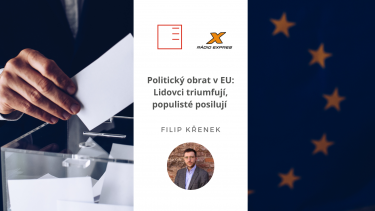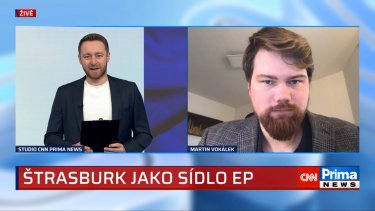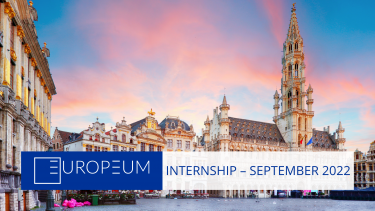Rádio Expres | Political turnaround in the EU: Populists strengthen and changes in France and Belgium
In Europe populist and far-right parties strengthened in several member states. The European elections brought changes at the national level. France faces early elections, and the Belgian Prime Minister announced his resignation. Project Coordinator and Analyst from EUROPEUM Institute Filip Křenek, commented for Slovak Rádio Expres.
Show more
CNN Prima News | Two plenary session locations of the European Parliament
The MEPs discussed the difficulty of changing the seat of the European Parliament, which periodically moves from Belgium to France. Most agreed that they would welcome if this movement was canceled. However, France would probably veto such a change in the treaties. What are the arguments for and against moving the European Parliament periodically? Is there any way out of this problem, or will Strasbourg's role remain the same for decades to come? Martin Vokálek, Director of EUROPEUM Institute for European Policy, commented for CNN Prima News on the issue.
Show more
ČRo Plus | First World Nuclear Energy Summit in Belgium
The first Nuclear Energy Summit was held in Belgium with over 40 countries in attendance. Their deputies discussed the future of nuclear energy, not only in Europe, but also worldwide. Žiga Faktor, head of EUROPEUM's Brussels office, commented on the conclusion of this event in Brussels for Czech Radio Plus.
Show more
BLOG | Belgium’s 2024 elections: Navigating Flemish nationalism amidst European challenges
Belgium is gearing up for several elections this year. In addition to the European elections, Belgian citizens will also vote for the federal and regional parliaments on the same day. Although this arrangement is nothing new in Belgium, it may make it more difficult for voters to distinguish between the different election campaigns. Growing Flemish nationalism may also bring complications. These topics are addressed by Nicolas Rouillard in his new blog.
Show moreČRo Plus | Belgian Presidency
Belgium takes over the EU Presidency from the Spanish. What challenges does Belgium face in this role and how does it plan to achieve its objectives? Viktor Daněk, Deputy Director of EUROPEUM Institute, explains.
Show moreOne World in Brussels | Screening of the film "BLIX NOT BOMBS" + discussion
We cordially invite you to the screening of the film BLIX NOT BOMBS and the subsequent debate, which takes place as part of the Brussels branch of the One World Festival in cooperation with our Brussels office. The screening will take place on Monday, 24 April, at 19:00.
Show moreČRo Radiožurnál | How can EU interior ministers adjust the rules for returning failed asylum seekers?
The attack on two football fans in Belgium has exposed the inefficiencies and flaws in Belgium's migration policy. How can EU interior ministers adjust the rules on returning failed asylum seekers? Our deputy director, Viktor Daněk, commented on the topic in the Odpolední publicistika programme.
Show moreJob offer: Internship at our Brussels Office (Spring/Summer 2023)
EUROPEUM’s Brussels Office is offering internship positions from February 2023 to July 2023. See the attached PDF file bellow for more information about the offer.
Show more PDF
Job offer: Internship at our Brussels Office (Autumn/Winter 2022/2023)
EUROPEUM’s Brussels Office is offering internship positions from September 2022 to January 2023. See the attached PDF file bellow for more information about the offer.
Show more PDF
Job offer: Internship at our Brussels Office (Spring/Summer 2022)
EUROPEUM’s Brussels Office is offering internship positions from March to July 2022. See the attached PDF file bellow for more information about the offer.
Show more PDF

Staroměstské náměstí 4/1
Prague 1 - Staré Město
110 00
tel.: +420 212 246 552
email: europeum@europeum.org
https://www.europeum.org









